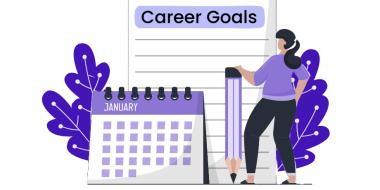How To List Relevant Coursework on Your Resume
Most students and recent graduates do not have a wealth of professional experience to list on a resume, so including relevant coursework can help potential employers get an idea of the skills and qualifications that you are currently developing. This article will cover what relevant coursework is as well as how and when to include it on your resume.

What is Relevant Coursework?
Relevant coursework refers to the classes and subjects that you studied in school which are useful for the position that you are applying for. For example, if you are applying to a marketing position and you have taken classes in psychology that focus on language, emotion, and motivation, that class would be considered relevant since the goal of marketing is to use language and emotion to motivate people to purchase goods and services.
Relevant coursework doesn’t only have to be strictly classes. You can also include academic projects like a thesis or dissertation as well as research that you have done. Online courses are also acceptable to list if they pertain to the job.
The courses and projects that you include must actually be relevant to the position that you are applying for. Don’t list your entire transcript - instead, choose the top 3-5 courses, projects, or subjects that are the most relevant.
If it’s not immediately clear why you are listing a course on your resume, consider including a brief description of the subject materials, projects you completed for the class, and/or how the class will help you perform in the position that you are applying for.
When To Include Relevant Coursework on Your Resume
Consider including relevant coursework on your resume if you are currently a student, you’ve recently graduated, you are applying to an internship, or you are applying to entry-level positions. Additionally, if you are applying to academic or other education-focused positions, it may be appropriate to include relevant courses and details about your studies.
Especially if you have taken AP, IB, or honors classes, listing relevant courses on your resume can show potential employers that you are intelligent, dedicated, and studious.
Finally, if the employer asks for details like a certain degree or diploma, your GPA, or a portfolio of past projects that you have completed, that can be a cue that they will be pleased to see your relevant coursework on your resume as well.
When Not To Include Relevant Coursework
If you have more than a year of professional work experience, you likely don’t need to include relevant coursework on your resume. If you have more than five years of work experience, you almost definitely do not need to include high school or college coursework. Employers will be focused more on your recent work experience than classes that you took many years ago.
Additionally, if you are applying for entry-level positions where school coursework isn’t particularly relevant at all (such as waitstaff jobs, outdoor recreation positions, etc.) then you may be better off focusing on hard and soft skills and certifications over schoolwork.
Selecting relevant coursework to advance your career
If you’re at the beginning (or even in the middle) of your college journey, it’s important to consider your future career as you select your course load. This will ensure you can list relevant coursework on a resume when it’s time for you to begin job hunting.
One way to do this is to research job titles you would like to have in the future and align the courses you select with the common skills listed in the job descriptions. If your school publishes a catalog, you may want to consult the course descriptions to figure out the skills you’ll gain from each course.
For example, someone who wants to go into marketing may take relevant courses in market research, consumer behavior, or emotional psychology. A person looking to be a graphic designer may need to take classes in typography, color theory, or UX design.
In some cases, your intended career will dictate the coursework you must take. For example, if you intend to be a certified public accountant, you may be required to take classes in auditing, tax concepts, business administration, and forensics. These classes are necessary to obtain certification and work as a CPA.
However, even in these cases, your schedule may still leave room for elective courses. If so, choose classes that will help you build relevant skills for your profession. For an accountant, those skills might be communication, critical thinking, and research strategies. Your related coursework, alongside your academic achievements, will help you stand out as a thoughtful, well-prepared candidate.
Make sure you use the resources available to you, such as academic and career counselors. These professionals have extensive experience helping people choose relevant classes that align with their career goals, and they can likely design an academic track to help you get where you want to be.
How To List Your Relevant Coursework
When crafting your job application, you don’t need a special relevant coursework resume section. Instead, you can incorporate this information into standard resume sections. If you’ve decided that it makes sense for you to include your relevant coursework on your resume, here’s how to do so:
Add Courses to Your Education Section
Naturally, it makes the most sense to add relevant coursework to the education section of your resume. You can add a subsection under each degree that you earned or school that you attended, or you can place your coursework at the bottom underneath all of your school details.
If you have little or no professional experience, place your education section first on your resume, just below your header and your resume objective. You may also wish to use a functional or skill-based resume format to highlight your skills. If you do have some relevant professional experience to list, place that at the top and your education section underneath.
Use either a comma-separated list, a simple bulleted list, or a bulleted list with some additional details for each course.
For example, here’s how to list coursework in a comma-separated list:
BA in Journalism
UC Davis, Davis, CA
Relevant Coursework: Ethical Journalism, Global Journalism, Technical Writing
You can also use a bulleted list, which can be helpful if you want to demonstrate proficiency in multiple fields:
BA in Journalism
UC Davis, Davis, CA
Relevant Coursework: Journalism
- Ethical Journalism
- Global Journalism
- Editor of the weekly student newspaper
- Completed Research Internship with LA Times
Relevant Coursework: English
- Technical Writing
- Creative Writing
- Expository Writing
Finally, you may wish to include a short description of each course that reinforces its relevance to the job. When listing relevant coursework, you can include details about projects you completed in those classes. Here’s an example:
BA in Journalism
UC Davis, Davis, CA
Relevant Coursework:
- Ethical Journalism - Learned principles and practices to ensure the accurate, complete, and fair exchange of information. Completed a hands-on project that included evaluating sources for real news stories to determine the accuracy of the reporting
- Global Journalism - Learned how to present news items with a global outlook and report on issues that affect the entire world
- Completed Research Internship with LA Times - Learned the basics of journalistic research and the processes involved in operating the largest metropolitan daily newspaper in the country
Expert Tip
Tailor Your Relevant Coursework to Each Position
For every job you apply to, ensure that your resume lists only relevant coursework and projects that showcase job-related skills. Tailoring your entire resume to each position can help your application pass automated applicant tracking system (ATS) scans and get your resume into the hands of a human hiring manager. This can be achieved by using keywords and phrases from the job description as well as pertinent industry keywords throughout your resume to demonstrate that you have the qualifications, skills, and experience necessary for the job.
You can even tailor your education section and your relevant coursework to the job posting. Especially if you opt to use a detailed, bulleted list of relevant coursework, you can use the description of each course as an opportunity to include more keywords.
Start with the most relevant courses
Again, all the coursework that you include on your resume should be directly relevant to the position you are applying for. For example, if you’re applying for a job in the arts, you don’t need to give details about the math classes you took because they don’t represent relevant coursework. Resumes should always be customized for the position you want, and including unnecessary information prevents you from achieving that goal.
When listing courses, always start with the most relevant coursework first within your list. Most hiring managers will only spend a few seconds scanning your resume, so it’s crucial to put your most impressive and important details first.
Consider Adding Other Education Details
If you decide to include relevant coursework, you may wish to add other educational details and achievements as well to round out your academic background. For example, you might include your GPA (if it’s above a 3.5) and awards like honor roll, scholarships, dean’s list, being valedictorian/salutatorian, Latin honors (magna cum laude, etc.), and so forth. You can also include membership in school, national, or international honor societies, business or professional fraternities, and other groups or organizations.
Key Takeaways
Adding relevant coursework is a great way to beef up your resume if you do not have professional work experience to list, such as if you are currently a student, you’ve recently graduated, or you are applying to entry-level jobs. It can also be appropriate to include your coursework if you are applying for an academic-based position. If you do include your relevant coursework, ensure that it is, in fact, relevant - only include courses if they directly boost your ability to perform the job you are applying for.
Need help creating a resume to highlight your relevant coursework? Check out Jobseeker’s resume builder tool, which allows you to add your details and easily swap between resume templates, styles, colors, and more with just a few clicks. Then, download your polished, professional resume instantly and get started applying for jobs!
Impress potential employers with your resume
Follow step-by-step professional guidance to create a polished resume in minutes.



